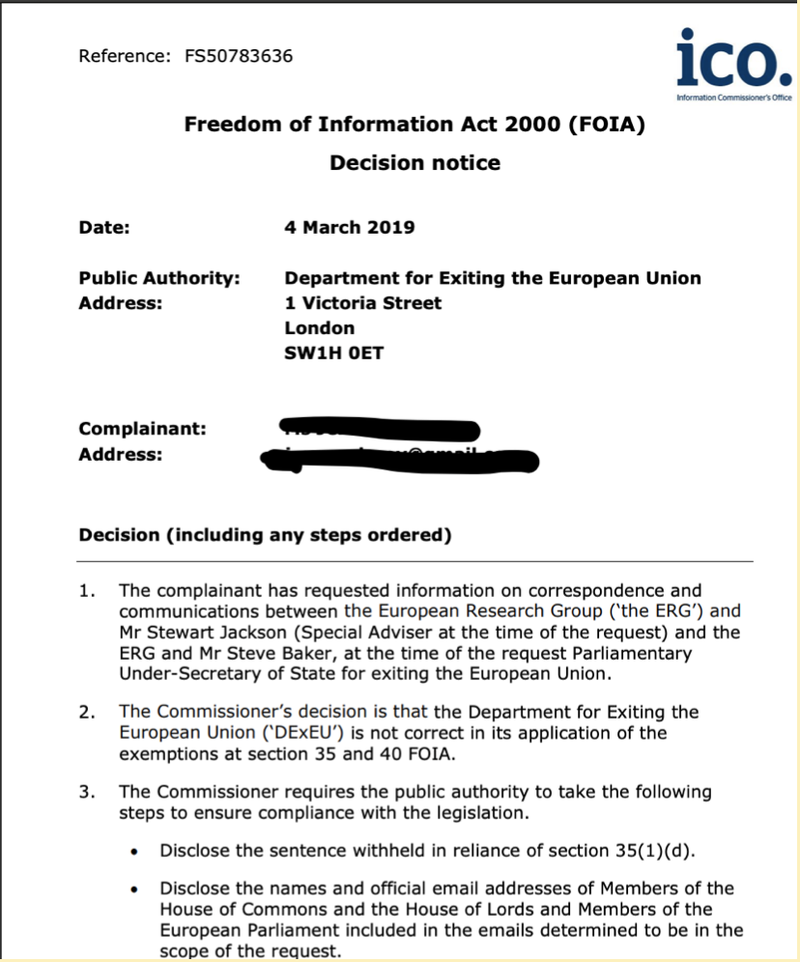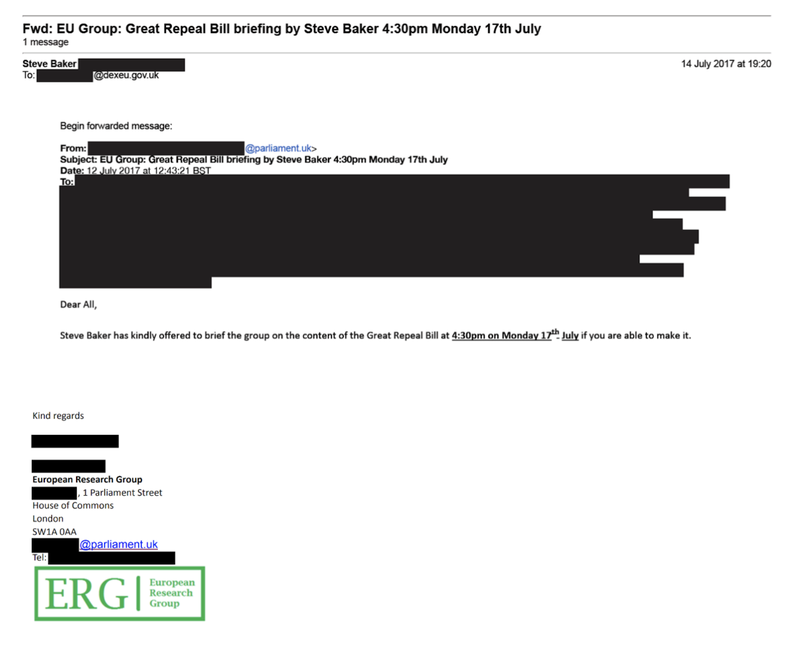Government Ordered to End Secrecy Over Jacob-Rees Mogg’s ‘Hard’ Brexit ERG Lobby Group

Information Commissioner rules that Brexit department must release names of European Research Group MPs, following openDemocracy Freedom of Information appeal
***
There are few more powerful forces in British politics at present than the pro-Brexit European Research Group. The influential group of Tory MPs, led by Jacob-Rees Mogg, has pledged to torpedo Theresa May’s Brexit deal when it returns to the Commons on Tuesday. But just who the ERG are has long been shrouded in secrecy.
The ERG’s various spokespeople have long refused to name its members, or even confirm how many supporters it has – despite the group being funded by taxpayer money. In a ‘car crash’ interview with Channel 4 News in 2017, Tory MP Suella Fernandes said that a list of ERG members was “available if necessary”. No such list has ever been published.
Now that secrecy is set to end, after the Information Commissioner’s Office (ICO) ruled that the Department for Exiting the European Union (DExEU) must release a list of ERG members. The move comes after openDemocracy appealed to the information watchdog when DExEU redacted the names of ERG members named in a 2017 email exchange with then Brexit minister Steve Baker.
Baker, a former ERG chair, became a minister in June 2017. Just weeks later, he offered a private briefing for the ERG on the so-called Great Repeal Bill, the parliamentary act for provides for leaving the European Union. One email noted how there is a “larger group” and “a smaller more senior one” within the ERG.
Following a Freedom of Information request, openDemocracy revealed the existence of Baker’s offer last year. But DExEU redacted the email correspondence so that the ERG members could not be identified.
However, the information commissioner has now rejected DExEU’s claim that releasing the names of ERG members included in Baker’s email would breach data protection laws.
“The names and parliament email addresses of the MPs, MEPs and Lords redacted from the emails disclosed should be provided,” the ICO ruled. The ICO added that ERG members’ names are “constantly placed in the public domain” and “they frequently use publicly accessible Twitter accounts to provide their views”.
The ERG, which has been described by Tory sources as ‘a party within a party’, has used hundreds of thousands of pounds of taxpayers’ money to fund its operations, but has repeatedly refused to make public the names of its members.
The ERG’s ranks have included a number of prominent cabinet ministers such as Michael Gove, Andrea Leadsom and Chris Grayling. Steve Baker has emerged as among the most vocal critic of the prime minister’s Brexit deal since resigning from the government last year over May’s Chequers proposals.

‘Resisting transparency’
The ICO ordering DExEU to release the names of those redacted in the communications could shed further light on who exactly is attached the hardline pro-Brexit group.
Transparency International hailed the Information Regulator’s ruling as “very timely given the current political debate” and urged DExEU “to comply as a matter of urgency”.
“The gravity of decisions under ministerial consideration are almost incomparable in living memory. It is therefore of utmost importance that the public are not kept in the dark about how these are made and whose interests are in play. Resisting such transparency only raises the suspicion that there is something to hide,” said Steve Goodrich, senior research officer at Transparency International.
DExEU has around a month to release the list of ERG members. Responding to questions from openDemocracy, the department said:
“We are considering the ICO’s decision and will issue our response in due course.”
Liberal Democrat MP Tom Brake accused DExEU of a “shameless attempt” “to shroud in secrecy its meetings with the ERG” and of “a desperate ploy to conceal how a cabal of MPs are puppeteering spineless Minister.”
Labour MP Ben Bradshaw said that it was “completely unacceptable that we have to rely on the Information Commissioner” to discover the identity of the ERG’s core membership.
“These are the people who are currently holding our country to ransom and working to take us crashing over the Brexit cliff edge in two weeks’ time, yet they refuse to operate transparently and honour the accepted rules of democratic and political behaviour,” Bradshaw said.

‘Secretive yet influential’
The ERG is a secretive yet influential group composed of backbench Conservative MPs, many of whom have pushed for a no-deal Brexit. The group also has strong connections to pro-Brexit think tanks such as the Institute for Economic Affairs.
openDemocracy has previously revealed how the ERG operates a secret second bank account, despite taking at least a quarter of a million pounds of taxpayers’ money.
The ERG has also accepted a donation from the Constitutional Research Council – a secretive organisation that channelled a controversial £435,000 donation to the DUP’s Brexit campaign. The organisation is headed by Richard Cook, a former Conservative general election candidate implicated in illegal international waste shipments.
The ERG is classed as a parliamentary research service provider which produces materials for its members. This research is not made public. The Independent Parliamentary Standards Authority (IPSA) reviews the output produced by parliamentary research service providers, including the ERG.
Using Freedom of Information legislation, openDemocracy has requested that the parliamentary watchdog disclose research materials produced by the ERG that it holds. IPSA has so far refused, but openDemocracy will be arguing for the release of the materials at the Information Tribunal. The hearing scheduled to take place on May 2.
*
Note to readers: please click the share buttons below. Forward this article to your email lists. Crosspost on your blog site, internet forums. etc.
Featured image is from Sky News

